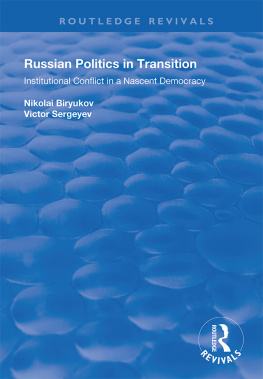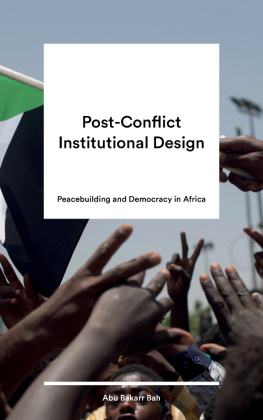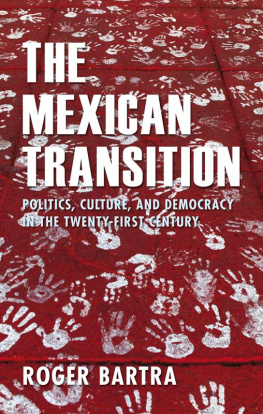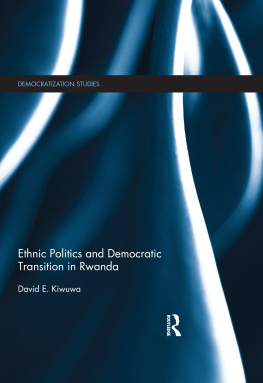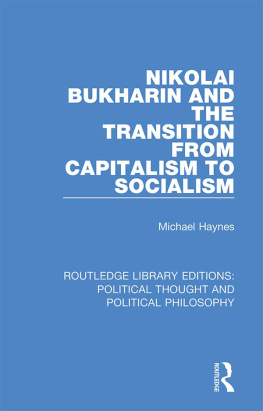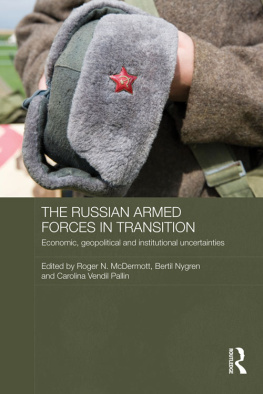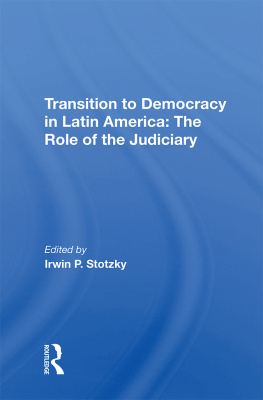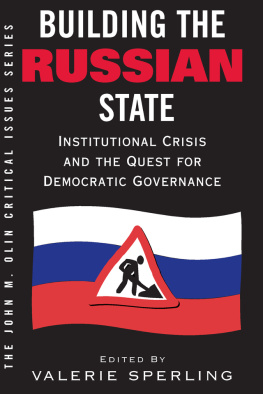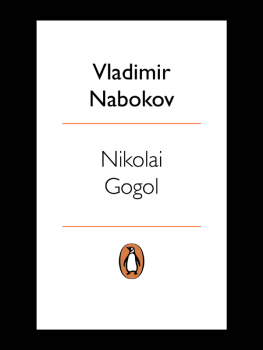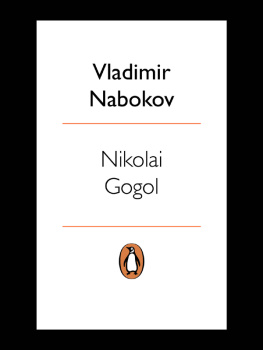First published 1997 by Ashgate Publishing
Reissued 2018 by Routledge
2 Park Square, Milton Park, Abingdon, Oxon OX14 4RN
52 Vanderbilt Avenue, New York, NY 10017
Routledge is an imprint of the Taylor & Francis Group, an informa business
Copyright Nikolai Biryukov, Victor Sergeyev 1997
All rights reserved. No part of this book may be reprinted or reproduced or utilised in any form or by any electronic, mechanical, or other means, now known or hereafter invented, including photocopying and recording, or in any information storage or retrieval system, without permission in writing from the publishers.
Notice:
Product or corporate names may be trademarks or registered trademarks, and are used only for identification and explanation without intent to infringe.
Publisher's Note
The publisher has gone to great lengths to ensure the quality of this reprint but points out that some imperfections in the original copies may be apparent.
Disclaimer
The publisher has made every effort to trace copyright holders and welcomes correspondence from those they have been unable to contact.
A Library of Congress record exists under LC control number: 97030129
ISBN 13: 978-1-138-35421-0 (hbk)
ISBN 13: 978-0-429-42497-7 (ebk)
This book is an outcome of a study that would have hardly been completed without the financial support of the Russian Foundation for Fundamental Research. summarise the results of a research project supported by the Economic and Social Research Council, Great Britain, (ESRC Award Reference No. R000234454, "Political Culture and Social Innovation: The Russian Supreme Soviet"). The authors are glad to express their deep gratitude to both these institutions.
They would also like to thank Dr. Sergei Filatov, former First Deputy Chairman of the Russian Supreme Soviet, for the singular opportunity to observe the workings of the Russian parliament from the inside, to Mr. Vladimir Novikov, former Chairman of the Council of Factions, and to Mr. Vladimir Pryamukhin, former Adviser to First Deputy Chairman, the Russian Supreme Soviet, for their timely assistance in obtaining the relevant material. We are likewise thankful to Dr. Leonti Byzov, in 1992-93 Chief Specialist of the Supreme Soviet Committee for Mass Media, Connections with Public Organisations, Mass Movements of Citizenry and the Study of Public Opinion, for consistent cooperation.
We thank the Analytical Centre for Scientific and Industrial Policies, the Russian Academy of Sciences, for providing facilities for their research and, in particular, its Director, Dr. Yakov Dranyov, and Dr. Andrei Belyaev for their most valuable contribution in it. We are also grateful to the Moscow State Institute of International Relations (University) and, especially, to the members of its Department of Philosophy and for their agreeable attitude and intelligent comments.
Some of the ideas that form the theoretical background of this study have originated from our previous research that resulted in Russia's Road to Democracy (Aldershot, Hampshire: Edward Elgar, 1993). We would like to thank Professor George W. Breslauer of the University of California, Berkeley, Professor Eric P. Hoffmann of the University of Albany, Profeesor Olof Petersson of the University of Uppsala, Professor Robert C. Tucker of Princeton University and Professor Stephen White of the University of Glasgow for their challenging criticisms of that book that encouraged us to embark on this new academic adventure.
Throughout these months of scholarly effort and civil discomfort we have been lucky to enjoy the unfailing support of the faculty and staff of the Department of Politics, the University of Leeds. We would like to thank its Head, Professor David Bell, and Professor Lionel Cliffe for the repeated opportunity to discuss our findings with learned colleagues from Great Britain, and Dr. Jeffrey Gleisner and Dr. Paul Chaisty for their competent comment. Our special thanks are due to Professor David Beetham, Director of the Centre for Democratisation, the University of Leeds, for the obliging stimulus of including this book in the series of the Centre's publications.
We are grateful to the Know-How Fund and the Westminster Foundation for Democracy for their financial support for the seminar on "Making Parliament and Its Fractions Work" (London- Leeds, January 1993) which we helped to organise and which gave us a remarkable chance to communicate with leading members of the Russian Supreme Soviet's factions and committees in an informal and friendly atmosphere.
This research might have remained a clannish endeavour, but for the friendly assistance of colleagues from various countries that enabled us to present our findings, both preliminary and final, to gatherings of professional critics. We thank Professor Walter F. Murphy and Professor Robert C. Tucker of Princeton University, for the opportunity to discuss "Problems of Russian Constitutionalism" with American students of constitutional law (Princeton, November 1993); Professor David Anderson, Director, and Professor Steffen Sachs, Deputy Director, Aspen Institute, Berlin, for the opportunity to attend the conference on "Russia's Path to an Open Society" (Aspen Institute, Berlin, April 1994); Professor Lorina Repina of the Institute of Universal History, Russian Academy of Sciences, for the invitation to participate in the international conference on "Political History on the Eve of the 21st Century: Traditions and Innovations" (Institute of Universal History, Moscow, May 1994); Professor Axel Hadenius of the University of Uppsala, for the organisation of the seminar on "Russian Political Culture" (the University of Uppsala, May 1994); Professor Dr. Gerhard Goehler of the Free University of Berlin, Professor Bhikhu Parekh of the University of Hull, as well as the Press and Information Bureau, the Federal Government, Germany, for the unique chance to meet the leading political scientists of today at the Sixteenth World Congress of the International Political Science Association (Berlin, August 1994); Professor Rei Shiratori, Director, Research Institute of Social Science, Tokai University, and Professor Fred W. Riggs, the Committee on Viable Constitutionalism, for the obliging invitation to partake of the international symposium on "Presidential System and Parliamentary System in Crisis" (Tokai University Pacific Center, Honolulu, November 1994); Dr. Jeremy R. Azrael, Director, Russia Initiative, RAND Corporation, for the chance to debate on "Problems of Russian Federalism" with experts from the RAND Corporation (Santa Monica, California, January 1995); Professor Alexei V. Shestopal of the Moscow State Institute of International Relations (University), for the permission to address the standing seminar of the Department of Philosophy (May 1995) and Professor Bjoern Wittrock of the Swedish Collegium for Advance Study in the Social Sciences, for the opportunity to attend the seminar on "Social Revolutions" (Uppsala, June 1995).
The authors are obliged to Professor Paul Chilton, of the University of Warwick (Coventry), Professor Arthur Marwick of the Open University (Milton Keynes, Buckinghamshire), Professor William Kerby of the University of Hamburg, Dr. Dina Model of the Institute of Universal History, Russian Academy of Sciences, and Professor Rei Shiratori of the Tokai University for their help in publishing our findings in scholarly magazines.


